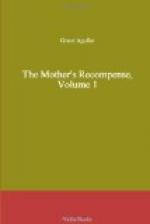“Not so much as, for Lilla’s sake, I could have wished. She has been so unfortunately prejudiced against her both by Annie and Miss Malison, that although I am convinced she loves her child, she never will evince any proof of it; and Lilla’s unhappy temperament has, of course, increased this prejudice, which I fear will require years to remove, unless Annie be soon married, and Miss Malison removed from Lady Helen’s establishment. Then Lilla’s really excellent qualities will quickly be made evident.”
“Mr. Grahame is already convinced she is a very different girl to that she has been represented, is he not?” asked Ellen.
“He is; and I trust, from the awakened knowledge, happiness is dawning upon them both. I could not see unmoved his struggle to part with her to-day, brief as the separation will be—scarcely six short months.”
“I was quite sure Mr. Grahame loved his children, though Annie and Cecil did say so much about his sternness,” said Emmeline, somewhat triumphantly.
“Mr. Grahame’s feelings are naturally the very wannest, but disappointment in some of his dearest hopes has, in some cases, unfortunately caused him to veil them; I regret this, both for Cecil and Lilla’s sake, as I think, had he evinced greater interest and affection for them in their childish years, they might both have been different in character.”
“But it is not too late now?”
“I trust not for Lilla, but I greatly fear, from all I have heard, that Cecil’s character is already formed. Terrified at his father’s harshness, he has always shrunk from the idea of making him his friend, and has associated only with the young men of his mother’s family, who, some few years older than himself, and devoted to fashion, and gay amusements, are not the very best companions he could have selected, but whose near relationship seems to have prevented all interference on the part of Mr. Grahame. Cecil must now be sixteen, and I fear no alteration in his father’s conduct will efface the impressions already received.”
“But, changed as Mr. Grahame is towards Lilla, was it still necessary for her to go to Mrs. Douglas? Could not her reformation have been effected equally well at home?”
“No, my love; her father delighted at finding he had engaged her affections, and that some of the representations he had heard were false, would, in all probability, have gone to the contrary extreme, and indulged her as much, if not more, than he had previously neglected her. Lilla has very many faults, which require steady yet not harsh correction, and which from her earliest age demanded the greatest care; being neglected, they have strengthened with her years. The discipline she will now be under will at first be irksome, and perhaps Lilla may find all I have said in Mrs. Douglas’s favour very contrary to reality; but I have such a good opinion of her docility, when reasoned with kindly, that I do not doubt all such impressions will be effaced when she visits us at Christmas.”




